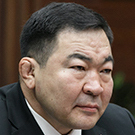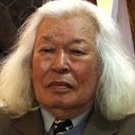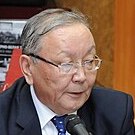Cabinet of the Mongol Uls: Difference between revisions
Mongol Uls (talk | contribs) |
Mongol Uls (talk | contribs) |
||
| Line 70: | Line 70: | ||
| July 22, 2022 | | July 22, 2022 | ||
| Rebiya Nur | | Rebiya Nur | ||
| [[File:Rebiya Nur]] | | [[File:Rebiya Nur.jpeg]] | ||
| style="background-color:#CC8A5C" | | | style="background-color:#CC8A5C" | | ||
| [[Central Asian People's Party|CAPP]] | | [[Central Asian People's Party|CAPP]] | ||
Revision as of 06:38, 10 December 2023
Second Orda Cabinet | |
|---|---|
2nd Cabinet of the Mongol Uls | |
| Incumbent | |
| Date formed | 22 July 2022 |
| People | |
| Head of government | Bataariin Orda |
| Deputy head of government | Batu Ganbat Sherig Toka |
| Member party | Greater Mongolia Movement Central Asian People's Party |
| Status in legislature | Minority |
| Opposition party | Uniting Mongolia Kok Bayraq |
| History | |
| Election(s) | 2022 |
| Predecessor | First Orda Cabinet |
The Cabinet of the Mongol Uls is the executive branch of the government of the Mongol Uls, responsible to the Kurultai. Tasked with the implementation of govenment policy, the Cabinet oversees the day-to-day affairs of the Khanate, manages foreign policy, and proposes an annual budget to the Kurultai. The second and incumbent cabinet is the Second Orda Cabinet, a minority cabinet led by Prime Minister Bataariin Orda and composed of the Greater Mongolia Movement and Central Asian People's Party, with external support from the Gurkani Clerical Association, the Islamic Modernist Party, and the Gangs Seng Ge (Tibetan People's Party).
Formation
The Cabinet must maintain the majority support of the Kurultai for confidence and supply votes; however, a single party has never won enough seats to govern alone, so all cabinets have been coalition governments with other parties providing additional external support. Forming a majority in the Kurultai is especially hard due to the fact that slightly less than a third of the Kurultai seats are held by nonpartisan Clan Chieftains, who by custom abstain on investiture, confidence, and supply votes. As investiture votes require an absolute (51 vote) majority, abstentions count as de facto "no" votes, meaning that Prime Ministers wishing to be invested must secure the support of more than three-quarters of those voting. While attempts have been made to change this law, such proposals have been voted down by minority parties, who rely on their kingmaker status in investiture votes in order to secure concessions for their constituents.
Composition
| Position | Since | Name | Picture | Party | |
|---|---|---|---|---|---|
| Prime Minister |
July 22, 2022 | Bataariin Orda | 
|
Independent (supported by DMN) | |
| First Deputy Prime Minister Minister of Foreign Affairs |
July 22, 2022 | Batu Ganbat | 
|
DMN | |
| Second Deputy Prime Minister Minister of Minority Affairs |
July 22, 2022 | Sherig Toka | 
|
CAPP | |
| Minister of Defense and the Interior |
July 22, 2022 | Origiyn Batu | 
|
DMN | |
| Minister of Finance and the Economy |
July 22, 2022 | Jambal Nomin | 
|
DMN | |
| Minister of Education, Culture, and Health |
July 22, 2022 | Rebiya Nur | 
|
CAPP | |
| Minister of Justice, Labour, and Social Affairs |
July 22, 2022 | Begum Lkhagvyn Maral | 
|
DMN | |
| Khalifa of Gurkaniyan (ex officio) |
N/A | Rashid Markhayev | GCA | ||
| Commander of the Golden Horde (ex officio) |
N/A | Dayanniin Khusei | DMN | ||
| Baskan of Kharkorin (ex officio) |
N/A | Ulusboludiin Mandukhai | DMN |